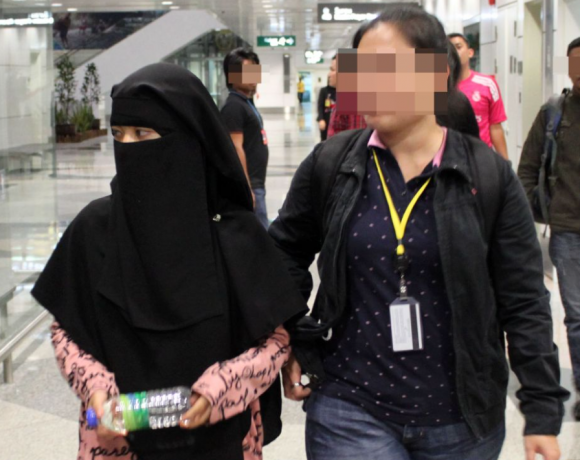 By Dr. Haezreena Begum binti Abdul Hamid
By Dr. Haezreena Begum binti Abdul Hamid
She is a Criminologist and a Deputy Dean (Postgraduate Affairs) of Faculty of Law, Universiti Malaya. Dr. Haezreena obtained her PhD in Criminology from Victoria University of Wellington, New Zealand.
Since the Syrian civil war erupted in 2011, evolving into a proxy conflict, thousands of women and minors from around the globe have journeyed to join or marry Islamist fighters in the terrorist organisation known as the Islamic State of Iraq and Syria (ISIS) or Daesh. This unprecedented surge in female migration to conflict zones is unparalleled, with no violent extremist group attracting as many female recruits. Despite the fall of Daesh in 2019, the organisation persists, continuing its recruitment propaganda both online and offline. The recent ISIS-Khorasan attack on the Crocus City Hall concert hall in Krasnogorsk, Moscow, underscores the ability of violent extremist groups to regroup and revive in pursuit of their political goals.
Media reports often portray women travelling to Syria and Iraq as ‘jihadi brides’ or as ‘comfort women,’ providing sexual services to boost the morale of fighters, sometimes termed ‘Jihad al-Nikah’ (sexual jihad). These women are seen as offering themselves for sexual comfort to Daesh fighters striving to establish Islamic rule in the Levant. The term ‘jihadi brides’ specifically denotes women migrating to Syria to marry jihadi fighters. These women are frequently depicted as naive, overly romantic, captivated by the glorified images of heroic fighters, and desiring to bear children to ensure the longevity of the Caliphate. Many are also portrayed as victims lured by unscrupulous men to Iraq and Syria. Within Daesh, women are often referred to as ‘mujahirat’ or migrants, travelling to the Caliphate to join the war effort.
The Syrian Network for Human Rights (SNHR) has revealed in its report that since March 2011, 16,442 women have been killed in Syria, and between March 2023 and March 2024, 21 incidents of violence against women, primarily due to their activism, have been documented. Despite the collapse of the Islamic State in 2019, reports indicate that women continue to migrate to these conflict zones to join the jihad proclaimed by the religious leaders of Daesh. Southeast Asian women are no exception, with Malaysian women reportedly travelling to Iraq and Syria to marry Daesh fighters. It is estimated that more than 30 Malaysian women have been involved with Daesh, having been either detained, released, or unaccounted for. Their involvement in Daesh is believed to be motivated by various factors, including jihadism and marriage.
In various narratives, the portrayal of women’s agency is often either underrated – ‘women as victims of devious men’ or overrated – ‘women as trying to surpass their male counterparts.’
In reality, some women choose to migrate to become part of what they perceive as a “new movement,” seeking empowerment and the opportunity to engage in meaningful activities. Reports indicate that some female Daesh bombers/martyrs consider themselves legitimate militant actors. Non-combatant women, on the other hand, see themselves as responsible for nurturing the next generation of jihadists. They view their roles as nurturers, lovers, or caretakers, with a mission to inspire their husbands and instil the values of jihad and martyrdom in their children. This is seen as a form of jihad that these women have willingly embraced. In some instances, women’s participation in jihad is described as community service and is considered a privilege, duty, and an act of public piety.

Women’s involvement in terrorism and terrorist organisations is neither a new phenomenon nor exclusive to the 21st century, nor is it confined to Islamist terrorist groups. Women have been associated with rebel organisations since the early 19th century, from the Narodnaya Volya (People’s Will) in Tsarist Russia, to the 20th-century groups such as the Shining Path in Peru, the Tamil Tigers of Eelam in Sri Lanka, the Kurdistan Workers Party in Turkey, Hamas in Palestine, the Zapatista movement in Mexico, Abu Sayyaf in the Philippines, the Taliban in Afghanistan, the Revolutionary Armed Forces of Colombia (FARC) in Columbia, the Red Brigade in Italy, Front Line (Prima Linea) in Italy, the Weather Underground in the United States, and many others. Throughout history, women have participated in violent uprisings, taking on strategic, supportive, and even combat roles in a wide range of violent movements.
Early literature has established that some women choose terrorism willingly and are more inclined to participate in terrorism, rather than being coerced or pressured into it. Although nuances exist in women’s motivations for migrating to conflict zones, they are often perceived as either passive victims or feminist warriors. The former reinforces the stereotypical notion of an ideal victim, while the latter denies any vulnerability or fragility. Consequently, displaying signs of agency may be viewed as a form of ‘deviant’ behaviour. This binary categorisation is problematic because it divides women into victims or agents/perpetrators, when in reality, the boundaries between the two are often blurry.
The agency of victims of terror-trafficking fluctuates between the extremes of being a powerful agent and a vulnerable victim. Women may initially choose to marry a combatant but later find themselves trafficked or sexually exploited by terrorist groups. This entrapment does not negate a woman’s agency but restricts her right to full agency. Women can still exercise their agency, albeit within limited choices and constraints. They may decide to comply with their captors or remain silent as a strategy to minimise harm. However, media and state authorities often fail to recognise this oscillation of agency and view it as incompatible with their victim status. This perception overlooks women’s strength, resilience, and agency, and penalises women for taking an active role in their lives.
Terrorist entities often perpetuate patriarchal attitudes, normalising harmful and violent patriarchal practices. Some women may normalise abusive experiences or sexual exploitation and internalise negative self-worth or low expectations of themselves. These practices not only perpetuate a culture of victim-blaming but also normalise violence against women. They create an idealised version of a victim, which hinders the understanding of women’s real lived experiences of victimhood. Consequently, some women may choose to live in denial as a coping mechanism, internalising the harm inflicted upon them. The denial defence mechanism can serve as a means to avoid uncomfortable realities, such as grief or anxiety, or as a way of coping with distressing situations, unpleasant feelings, or traumatic events, protecting women from physical and emotional pain.
Recommendations for Women Returnees
It is crucial to acknowledge that some women returnees may still be traumatised from their experiences in conflict zones and require time to heal and recover. Therefore, deradicalisation programmes for returnees and detainees should be implemented sensitively to avoid re-traumatisation. Women’s rights to agency and self-determination must be upheld in accordance with the Universal Declaration of Human Rights and the Convention on the Elimination of Discrimination against Women, to which Malaysia is a signatory.
Deradicalisation programmes should aim to empower women rather than exploit them or indoctrinate them with alternative beliefs or reinforce gender roles. The principle of “do no harm” should guide these programmes to prevent unintended negative impacts on women’s rights to agency and self-determination.
Actors and researchers who may pose a risk to women returnees and their children should be held accountable for unethical conduct to ensure fair treatment. The identities of women returnees should be respected and protected to prevent stigma, discrimination, and prejudice arising from exposure and ‘othering.’
To facilitate the reintegration of women returnees into society, government agencies, civil society, and the private sector should provide necessary support, including housing, food, stipends, education, medical care, and counselling. This can be coordinated through the upcoming National Action Plan on Countering and Preventing Violent Extremism (NAPPCVE). State agencies such as the Welfare Department, Ministry of Youth, Royal Malaysia Police, and others should collaborate with civil society and the private sector to share resources and facilitate a continuous reintegration programme for returnees.
Providing assistance can offer solace and confidence to women returnees, enabling them to reintegrate effectively into society, rebuild their lives, build new networks, increase their self-esteem, and contribute positively to society.
1. Anita Perešin, “Fatal Attraction: Western Muslimas and ISIS,” Perspectives on Terrorism 9, no. 3 (2015), http://www.jstor.org/stable/26297379
2. Tamila Varshalomidze, “Moscow concert hall attack news: At least 133 killed, over 100 wounded,” Al Jazeera (Doha) 2024, March 23, https://www.aljazeera.com/news/liveblog/2024/3/23/isil-says-it-was-behind-moscow-concert-hall-attack-that-killed-at-least-60.
3. Farida Ismail, “The Women Of The Islamic State” (Master Johns Hopkins University, 2019).
4. “On International Women’s Day, Growing Protests and Worsening Access to Basic Rights for Women in Syria,” Syrian Network For Human Rights, 2024, https://snhr.org/blog/2024/03/08/on-international-womens-day-growing-protests-and-worsening-access-to-basic-rights-for-women-in-syria/.
5. Amy Chew, “Malaysia offers citizens conditional return as ISIL crumbles,” AlJazeera (Doha) 2019, https://www.aljazeera.com/news/2019/3/12/malaysia-offers-citizens-conditional-return-as-isil-crumbles.
6. Ummu Atiyah Ahmad Zakuan, “Radicalization Of Women In ISIS In Malaysia: Profiling, Causes and Roles,” JATI-Journal Of Southeast Asian Studies, no. Special Issue (2018).
7. Ibid.
8. Fontefrancesco, “Chatting About Marriage With Female Migrants To Syria: Agency beyond the victim versus activist paradigm.”
9. Amanda N. Spencer, “The Hidden Face of Terrorism: An Analysis of the Women in Islamic State,” Journal of Strategic Security 9, no. 3 (2016).
10.”Women In Islamic State Propoganda: Roles and Incentives,” n.d, https://www.europol.europa.eu/sites/default/files/documents/women_in_islamic_state_propaganda.pdf.
11. Lara Deeb, “CHAPTER SIX. Public Piety as Women’s Jihad,” in An Enchanted Modern (Princeton: Princeton University Press, 2006).
12. Zakuan, “Radicalization of Women In ISIS In Malaysia: Profiling, Causes and Roles.”
13. Cindy D. Ness, Female Terrorism and Militancy Agency, Utility, and Organization (London: Routledge, 2008).
14. Groskop, “Chechnya’s Deadly “Black Widow”,” New Statesmen (Moscow) 2004, February 6, http://www.newsstatesman.com.200409060023.
15. Ness, Female Terrorism and Militancy Agency, Utility, and Organization.
16. Haezreena Begum binti Abdul Hamid, “Sex Trafficking, Victimisation and Agency: The Experiences of Migrant Women in Malaysia” (Doctor of Philosophy Victoria University of Wellington, New Zealand, 2020), http://researcharchive.vuw.ac.nz/bitstream/handle/10063/8748/thesis_access.pdf?sequence=1.
17. Ibid.
18. Haezreena Begum binti Abdul Hamid, “Exploring Victim Blaming Attitudes In Cases of Rape and Sexual Violence: The Relationship With Patriarchy,” Malaysian Journal of Social Sciences and Humanities 6, no. 11 (2021).
19. Brad Bowins, “Psychological Defense Mechanisms: A New Perspective,” The American Journal of Psychoanalysis 64, no. 1 (2004/03/01 2004), https://doi.org/10.1023/B:TAJP.0000017989.72521.26, https://doi.org/10.1023/B:TAJP.0000017989.72521.26.
20. “Women’s Autonomy, Equality and Reproductive Health in International Human Rights: Between Recognition, Backlash and Regressive Trend,” 2017, https://www.ohchr.org/Documents/Issues/Women/WG/WomensAutonomyEqualityReproductiveHealth.pdf.
21. Shamsuddin A, 2022. National Action Plan on Preventing and Countering Violent Extremism: Civil Society Deserves a Seat at the Table. INITIATE.MY Policy Brief, No. 1. Kuala Lumpur, Malaysia: INITIATE.MY, https://initiate.my/policy-brief-issue-1-2022/
22. Shamsuddin, A., Mat Rus, M., & Affianty, D. 2024. Reintegrating Former Security Detainees in Malaysia: The Challenges & Opportunities. INITIATE.MY Policy Brief, No. 5. Kuala Lumpur, Malaysia, https://initiate.my/reintegrating-former-security-detainees-in-malaysia-the-challenges-opportunities/
